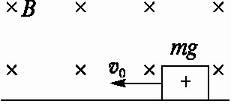问题
选择题
质量为m、电荷量为Q的带正电小物块在磁感应强度为B、方向垂直纸面向里的匀强磁场中,沿动摩擦因数为μ的绝缘水平面以初速度v0开始向左运动,如图12所示,经t时间走了s距离,物块停了下来.设此过程中q不变,则( )

图12

A.①③
B.②③
C.①④
D.②④
答案
A
物体速度减小,受洛伦兹力减小,故水平面对物块支持力减小,摩擦力减小,故①③正确.
质量为m、电荷量为Q的带正电小物块在磁感应强度为B、方向垂直纸面向里的匀强磁场中,沿动摩擦因数为μ的绝缘水平面以初速度v0开始向左运动,如图12所示,经t时间走了s距离,物块停了下来.设此过程中q不变,则( )

图12

A.①③
B.②③
C.①④
D.②④
A
物体速度减小,受洛伦兹力减小,故水平面对物块支持力减小,摩擦力减小,故①③正确.